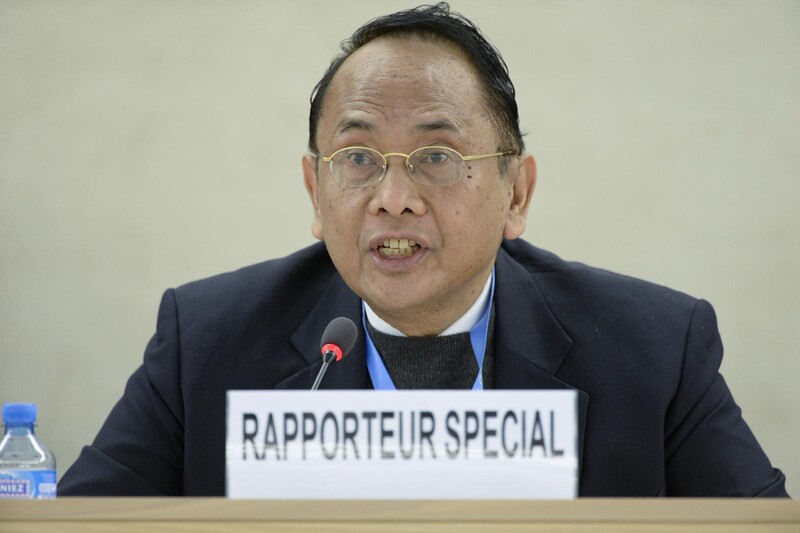You can’t report truthfully on Israel
شما نمی توانید صادقانه در مورد اسرائیل گزارش دهید
without facing its wrath
بدون مواجهه با خشم آنان
https://electronicintifada.net/content/you-cant-report-truthfully-israel-without-facing-its-wrath/15131
The Electronic Intifada 4 January 2016

Makarim Wibisono says Israel has blocked him from fulfilling his UN mandate to report on human rights violations in the occupied West Bank and Gaza Strip.
UN Photo
Makarim Wibisono has announced his resignation as UN special rapporteur on human rights in the occupied Palestinian territories, the position I held for six years until June 2014.
The Indonesian diplomat says that he could not fulfill his mandate because Israel has adamantly refused to give him access to the Palestinian people living under its military occupation in the West Bank and Gaza Strip.
“Unfortunately, my efforts to help improve the lives of Palestinian victims of violations under the Israeli occupation have been frustrated every step of the way,” Wibisono explains.
His resignation reminds me in a strange way of Richard Goldstone’s retraction a few years ago of the main finding in the UN-commissioned Goldstone report, that Israel intentionally targeted civilians in the course of Operation Cast Lead, its massive attack on Gaza at the end of 2008.
I responded to media inquiries by saying that I was shocked, but not surprised. Shocked because the evidence was overwhelming and the other three distinguished members of the UN fact-finding commission stuck by the finding.
I was not surprised because I knew Goldstone – a former judge of the South African constitutional court – to be a man of strong ambition and weak character, a terrible mix for public figures who wander into controversial territory.
In Wibisono’s case I am surprised, but not shocked. Surprised because he should have known from the outset that he was faced with a dilemma between doing the job properly of reporting on Israel’s crimes and human rights abuses and gaining Israel’s cooperation in the course of gathering this evidence. Not shocked, indeed grateful, as it illuminates the difficulty confronting anyone charged with truthful reporting on the Palestinian ordeal under occupation, and by resigning Wibisono doesn’t allow Israel to get away with neutering the position of special rapporteur.
It is worth recalling that when Wibisono was selected as my successor, several more qualified candidates were passed over. Although the selection guidelines stress expert knowledge of the subject matter of the mandate, Wibisono gained the upper hand precisely because of his lack of any relevant background.
I can only hope that now the UN Human Rights Council will redeem its mistake by reviving the candidacies of Professor Christine Chinkin and Phyllis Bennis, both of whom possess the credentials, motivation and strength of character to become an effective special rapporteur.
The Palestinians deserve nothing less.
Honesty
When I met with Makarim Wibisono in Geneva shortly after his appointment as special rapporteur was announced, he told me confidently that he had been assured that if he accepted the appointment the Israeli government would allow him entry, a reassurance that he repeated in his resignation announcement.
I warned him then that even someone who leaned far to the Israeli side politically would find it impossible to avoid reaching the conclusion that Israel was guilty of severe violations of international humanitarian law and of human rights standards, and this kind of honesty was sure to anger the Israelis.
I also told him that he was making a big mistake if he thought he could please both sides, given the reality of prolonged denial of fundamental Palestinian rights. At the time he smiled, apparently feeling confident that his diplomatic skills would allow him to please the Israelis even while he was compiling reports detailing their criminality. He told me that he was seeking to do what I did but to do so more effectively by securing Israel’s cooperation. It was then my turn to smile.
Facing the heat
What I discovered during my six years as special rapporteur is that you can make a difference, but only if you are willing to put up with the heat.
You can make a difference by giving foreign ministries around the world the most authoritative account available of the daily realities facing the Palestinian people. By so doing you have to expect ultra-Zionist organizations and others to react harshly, including through a continuous defamatory campaign that seeks by any means to discredit your voice and will mount accusations of anti-Semitism and, in my case, of being a “self-hating Jew.”
What both shocked and surprised me was the willingness of both the UN secretary general and US diplomatic representatives at the UN to bend in Israel’s direction and join the chorus making such denunciations.
Although periodically tempted to resign, I am glad that I didn’t. Given the pro-Israel bias of the mainstream media in the United States and Europe, it is particularly important, however embattled the position, to preserve this source of truth telling.
My hope is that the Human Rights Council will learn from the Wibisono experience and appoint someone who can both stand the heat and report the realities for what they are.
Richard Falk is Professor Emeritus of International Law at Princeton University. Among dozens of books, he is the author of Palestine: The Legitimacy of Hope.
No comments:
Post a Comment